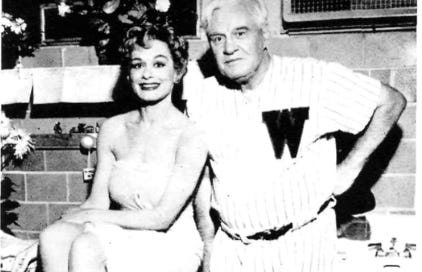By Jesse Spector
I’m doing some research that doesn’t directly involve — at least not yet — Pro Football Hall of Famer Jimmy Conzelman, the last man to coach the Cardinals to an NFL championship, back when they were the Chicago Cardinals, in 1947. and player/coach (he missed the second half of the season as a player after hurting his knee in a win over the New York Yankees) for the 1928 champion Providence Steam Roller.
The Steam Roller was Conzelman’s last team as a player — he’d also been with the Detroit Panthers, Milwaukee Badgers, Rock Island Independents, and Decatur Staleys… after a college career in which he’d been part of the 1919 Rose Bowl champion Great Lakes Navy Bluejackets, 17-0 winners over the previously undefeated Mare Island Marines.
George Halas was the star of that Rose Bowl for Great Lakes, and brought Conzelman with him to Decatur to join the NFL’s first team. Conzelman ran for the only touchdown of the Staleys’ game against Rock Island that inaugural season, and also threw two touchdown passes to Halas himself in a November game against the Hammond Pros.
All of that is fantastically interesting on its own and a reminder of how much football has changed in a century, but it’s a diversion from the tangent that I was already on, which is finding out how Conzelman’s coaching career ended.
Conzelman went 8-22-3 with the Cardinals from 1940-42, and resigned to go to St. Louis — little knowing that the football team would eventually do the same — to work as the public relations director for the St. Louis Browns, the baseball team.
Here’s how the Chicago Tribune described Conzelman when he headed southwest in 1943:
Conzelman attended Washington university, St. Louis, where he later coached, and during World War I, he was a member of the famous Great Lakes eleven. Conzelman is one of the most versatile personalities in the field of sports. In addition to his football activities he has been a boxer, newspaper publisher, writer, salesman, composer, actor, and radio commentator. He is an accomplished orator.
Conzelman worked for the Browns for two years, and those two years included their only American League pennant before heading to Baltimore and becoming the Orioles. And then he went back to coach the Cardinals again, won the 1947 NFL title, got to the 1948 NFL championship game… and quit to work in advertising.
And also act alongside Gretchen Wyler in a St. Louis production of Damn Yankees, before Wyler had the role on Broadway (she succeeded Gwen Verdon).
That picture ran in Sports Illustrated’s 1961 football issue, itself a trove worth diving back into another day. Gerald Holland’s piece on Conzelman is as interesting as the subject himself, and then there’s this succinct preview of University of Idaho football:
The Vandals went 2-7, led to an improvement over the previous season’s 1-8 by tight end Reggie Carolan, a future all-star with the Chargers and AFL champion with San Diego and Kansas City (on the team that lost Super Bowl I). Reggie’s son, Brett Carolan, played at Washington State and won Super Bowl XXIX as a rookie on the 49ers.
The aggregate score of those seven Idaho losses (to Oregon, Oregon State, Washington State, Army, Utah State, Pacific, and Arizona) was 319-22. But they got a 27-18 home win over San Jose State, and finished the season in style with a 16-14 win over Montana to take the Little Brown Stein… which, this year, Idaho recaptured for the first time since 1999.
This kind of journey down a rabbit hole might seem like hardcore fandom, but I find it to be quite different, and in fact one of the paths that has brought me to easier accept being a casual fan (for the most part, but very much for football) — all of the teams out there have their own stories, with their own people, their own traditions, and their own fanbases. There’s always going to be a winner and a loser (or a tie, in our more refined sports), and the sports experience is richer if we take it all in. The casual experience is about not letting it get you so down when your favorite team loses.
Is it perfect? Definitely not. We still haven’t recorded a mainline Willets Pod episode since Addy and I took in the Emma Stone Game, and while part of that is about adults having a hard time scheduling things, part of it is definitely about us having needed some time to recover as fans. (We’ll be back soon, promise.)
I’m glad, though, to see what I feel is a healthier approach to sports, starting to come around… or at least to welcome Bomani Jones to the party.

For the record, I’m still not off the Knicks “narcotic,” as Bomani terms his former Falcons fandom. I can keep it under control most of the time, but I don’t think I’m ever shaking it, not when writing this very sentence sent me looking for Zion Williamson’s contract status once again (poison pill on any trades until July 1, 2023 when… sign and trade???) and, well, yeah.

I enjoy year-end music lists because it’s a great way to come across stuff that isn’t in my wheelhouse, but I might enjoy… and thanks to the Internet, I can find out really quickly (unlike when I bought a Pavement CD in 1997 based on a magazine review).
So, here’s our friend Michele Catalano’s year in music, which unlike Pavement and Rolling Stone, I will not hold against anyone for decades to come if any of it isn’t my bag…
…and here’s an opportunity to revisit Pavement.
Take “Stereo,” the first track on Corners and perhaps the most accessible song Pavement have made since their (modest) hit, 1994’s “Cut Your Hair.” “Stereo” is a dynamic, almost AOR statement, and it builds to the band’s loudest, cleanest crescendo ever.
To me, it sounds like a mashup of Talking Heads and Weezer that manages to capture nothing of what I like about either, so I guess some things don’t change in 25 years. Although we also have the Knicks for that.

















Share this post